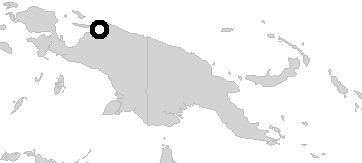
| www.CuriousTaxonomy.net |
|
The Flood in World Myth and Folklore
New Guinea |
| © 2021 Mark Isaak |

Oabimbeghi had a possum which she kept in a jar. She left him in the house with her two grandmothers while she went to the garden to get taro. She gave the little taros to her grandmothers and the big ones to the possum, which annoyed the grandmothers greatly.
Once when Oabimbeghi was out collecting fruits, they beat the possum to death. When Oabimbeghi returned, she gave the grandmothers their fruit and then went to the possum. She found him battered and dead in the jar.
She took his body into the forest and wept over him. The next day she took her two sons away from the house. Then, on her word, the stream rose and washed both of the grandmothers into the sea. She remained standing there until she could see them no more. Then she went back home.
G. J. Held, Waropense Teksten (Geelvinkbaai, Noord Nieuw-Guinea), Verhandelingen van het Koninklijk Instituut voor Taal-, Land- en Volkenkunde no. 20 (The Hague: Martinus Nijhoff, 1956), 40-41.

This story probably derives in part from the European tale of the raven and the carcass.
The great flood is named Aiwui. He washed over the shore. The people tied themselves to a tree and waited for low tide, but no low tide came.
They sent the ke (a kind of barbet) to fly out and look for land, but he found no land and returned. The crows, meanwhile, sat in the nipah palms.
Then the people sent the crow to fly. The crow found other people laying dead in their canoes, and he stopped to eat from them. The people waited in vain for him to return.
So they sent the ke out again. He saw the crow stuffing himself on the dead people. Then the crow went and called his fellow crows to join in on the many corpses. Their feasting made them thirsty, and one crow was sent to look for fresh water. He found a small creek, but an old woman guarded it. "You have to pay to drink from it," she said. So the crows flew back and forth and fetched beads and other objects with which they paid the old woman, and then she let them drink. The water was sweet, and they stayed with this old woman.
G. J. Held, Waropense Teksten (Geelvinkbaai, Noord Nieuw-Guinea), Verhandelingen van het Koninklijk Instituut voor Taal-, Land- en Volkenkunde no. 20 (The Hague: Martinus Nijhoff, 1956), 41-42.
